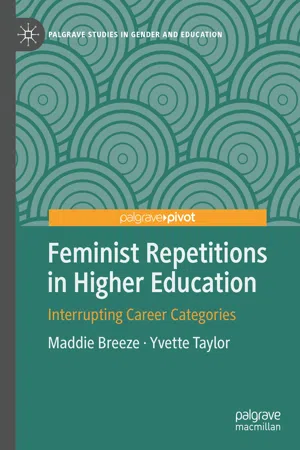Feminists have long been concerned with gender and work, including paid and unpaid labour, and entrances into professions. Work, and careers, are subject to a wide variety of analyses and activism, from socialist feminist demands through to corporate feminist exhortations to ‘lean in’ (Federici, 1975; Weeks, 2011; Sandberg, 2013). Feminist struggles over the gendered terrain of work include projects of recognising and re-valuing devalued feminised labour, as well as transforming professional fields that have systematically excluded women. We further understandings of the tensions and overlaps between different aspects of the feminist politics of work, via our focus on academic work and how feminists take up academic space via the categorical, hierarchical distinctions of the academic career course. We focus on how feminists occupy academic career categories—from PhD student and the ‘early career’ through to ‘established’, professorial and leadership positions—fitting into whilst also stretching and unsettling career stages and the meritocratic mobility promises of the academic career. In this introductory chapter we situate our analytic concern with feminist repetitions and interruptions, and contextualise the argument for re-thinking how feminists inhabit higher education (HE) via an empirically grounded understanding of academic careers; attending to what feminists do as we take up academic career categories.
The career course is stretched under the pressure of neoliberal, entrepreneurial HE, and fractured by entrenched intersecting inequalities, workforce casualisation and regimes of performance management. As we write, we are interrupted by both recurrent university-mandated time-consuming ‘accountability and development’ review processes, and ongoing industrial action against pay inequalities, casualisation, workload, and the real terms devaluation of pay and pensions in UK academia. Both these interruptions, managerial audits supposedly necessary for our career development and taking part in collective strike action can be understood, contestably and variously, as feminist engagements. As Ahmed (2017) reminds us, ‘we do not have feminist universities’ (p. 110), and feminists continue to struggle for both institutional recognition and the feminist transformation of the institution, just as universities selectively incorporate feminist scholarship (Pereira, 2017).
Feminist scholarship, and feminists themselves, occupy ambivalent positions in the academy. In the EU and UK for instance, women’s and gender studies research centres and degree programmes have been subject to closures, as well as the ‘mainstreaming’ of gendered analyses across social science and humanities curricula (Evans, 2011; Griffin, 2009), while feminist academics can be positioned as the lone ‘gender person’, embodying compartmentalised gender expertise for entire departments (Henderson, 2019). Concurrently, feminist scholarship is commercialised, and feminist ways of knowing are legitimated via their financial value to non-feminist corporate and performative universities (Pereira, 2015; Skeggs, 1995). ‘The achievement of feminism within academia’ is an ongoing, incomplete struggle that continues on multiple fronts, encompassing the lasting influence of feminist theory and methods on disciplines such as sociology, as well as the dilution, defeat, and attrition of feminism (Skeggs, 2008, p. 670).
Many aspects of feminist academic work are therefore laboriously repetitive, and feminists are interrupted in their work just as we work to disrupt and hope to transform the non-feminist university. To re-think the repetitions and interruptions of how feminists occupy academic space, we focus empirically on career categories. There are lively analyses of feminist repetitions beyond the university, across decades and across recurrent feminist ‘waves’, driven by amnesia and nostalgia (Rivers, 2017), and of grassroots organising interrupting prevailing neoliberal, white feminism (Olufemi, 2020). There is long-standing attention to cycles of progress and backlash (Faludi, 1991) and post-feminist incorporation and disavowal of feminist ideas and arguments (McRobbie, 2008). Likewise Griffin (2009) emphasises the iterative (rather than linear, teleological) character of women’s and gender studies as disciplines. Alongside such accounts of repetitions and interruptions over decades, we turn our attention to the micro sociological, the everyday interactions in which feminists in the academy repeat themselves, interrupt the non-feminist university, and are themselves interrupted across the career course.
Feminist academics negotiate the academic career course while working to shift the parameters of academic career success. Accordingly, throughout the book, we attend to four familiar feminist concerns in the form of conventional, and contested, recurrent approaches to inhabiting and transforming the academy. We further debates about doing feminist work in HE, by returning to the principles and practices of feminist strategies for taking up academic space. Each chapter focuses on one overarching repetitive feminist concern, and explores how feminists negotiate it via and across academic career stages. Chapter 1 addresses educational mobilities, Chap. 2 collaboration and care, Chap. 3 feminist leadership, and Chap. 4 considers experiential knowledge about becoming academic. In each chapter we question and interrupt such reiterative conventions in order to reinvigorate contemporary feminist academic practice and contribute to understandings of how feminists work to claim academic recognition while simultaneously labouring to transform how such recognition is defined and distributed.
We come to this project differently positioned in relation to the academic career course. We have previously written collaboratively, occupying and stretching categories of The Early Career Researcher and The Feminist Professor, demonstrating how such categories are disrupted as well as reified when feminists inhabit and collaborate across them (Breeze & Taylor, 2018). Speaking from these categories uncritically can involve the assumption that academics experience career stages homogenously despite differences and inequalities. Taking career stages for granted can re-inscribe the striving, upwardly mobile academic subjectivity, and a logic of progression up the ladder. As such, while our career stage experiences directly inform this book, we are cautious about over-identifying with the categories we currently sit within, and instead emphasise how we have been differently categorised, and that career stage locations are fractured, for instance by inequality regimes (Acker, 2006), institutional locations, and feminist commitments.
We work in the same UK university, a research intensive institution, entrepreneuri...
